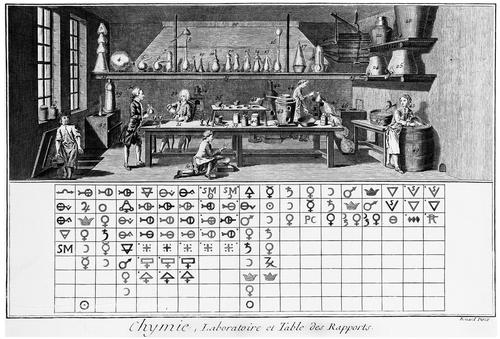Chemical laboratory, Paris. 1760.
Image Credit: Wellcome Collection. Attribution 4.0 International (CC BY 4.0).
(Medicine, Life, and Transformations of Matter Part II)
A conference organized by the associated project “Fermentation: A Cultural History of Knowledge” by Dr. Carmen Schmechel
Abstract and Call for Papers
As mechanist approaches grew in significance in the seventeenth century, the ancient Greek ‘souls’ were slowly driven out of physiology. In the eighteenth century, this development was almost definitive, with Georg Ernst Stahl holding a rather isolated position defending a biomedical soul (anima physico-medica).
At the same time, the new organic-anorganic divide was taking shape, crucially favoring the emergence of modern biology and biochemistry. These developments enabled new views on material transformations happening both in nature and in the body. Theories on metabolism were on the rise, including in more metaphorical and speculative senses, while scientists such as Lavoisier continued to be preoccupied with the micro-level descriptions and explanations of chemical change in matter. Medicine, on the other hand, tended to focus on more practical aspects due to its different goals. For medicine, of great importance was what effect substances and their metabolization have on the body, and how it influences disease: positively, negatively, causatively or accidentally. Nevertheless, chemistry’s relationship with medicine in the eighteenth century was less one of conflict and more one of mutual enhancement, with many practitioners active in both realms, such as Boerhaave or Stahl.
Situated at this nexus, this conference aims at mapping those chemical transformations which were of relevance in eighteenth-century medicine. How was respiration understood, in the light of new chemical discoveries by Lavoisier? What role did combustion play in physiology, and how did it differ from older ideas about fire, popular in the century before? How did these new understandings impact the thinking about the human body, as well as about broader issues such as the organic-anorganic divide?
Possible topics might address (but are not restricted to):
- the development of ideas about metabolism;
- theories of respiration and combustion (Lavoisier, Stahl);
- history of pharmacy and pharmacological theory in the 18th century (esp. effects of drugs on the body, and their explanations);
- material transformations involving fibers and tissues (such as Boerhaave and his interface of medicine and chemistry);
- new theories about digestion (such as Haller’s ideas on gastric motility, as well as his cell-fiber-particle theory);
- continuations and recontextualizations of older ideas (such as the nervous fluid as inheritor of „animal spirits“);
- enmeshing of speculative thought with systematic empirical observation in 18th c. chemistry and medicine;
- analogies between specific transformation processes in nature and in the body (or their hypothesized identity);
- the role of "life" in material and physiological transformations – in this century, less in the alchemia medica and more in the medical laboratory.
Thank you for sending an abstract of max. 250 words to transformations.of.matter [at] gmail.com, by March 15th, 2023. Notifications of acceptance will be sent by April 1st, 2023.
Scholarships for junior researchers
We strive for better inclusion of junior scholars. For graduate students and early career researchers who would like to give a paper at this conference, there is the option of applying for a scholarship to cover travel and accommodation in Berlin for the duration of the conference. Each scholarship is set at 400 Euro and there are two scholarships available, funded from the DFG Grant no. 432256662. If you wish to apply, please address the following to Dr. Carmen Schmechel at transformations.of.matter [at] gmail.com:
- title and abstract of your paper (abstract max. 250 words);
- short (1–2 pages) CV;
- short statement about current status: doctoral student, postdoc/early career, affiliated or not; please include any relevant info such as family-related career break; if you have an affiliation, please confirm that you are not receiving reimbursement for conference expenses from your university (max. 150 words)
Time & Location
Jun 29, 2023 - Jun 30, 2023
Freie Universität Berlin
SFB 980 Episteme in Bewegung
Sitzungsraum
Schwendenerstraße 8
14195 Berlin
Further Information
Creator and organizer: Carmen Schmechel (FU)
Sponsored by: Deutsche Forschungsgemeinschaft, Grant no. 432256662
Hosted by: Freie Universität Berlin; CRC 980 „Episteme in Motion”
